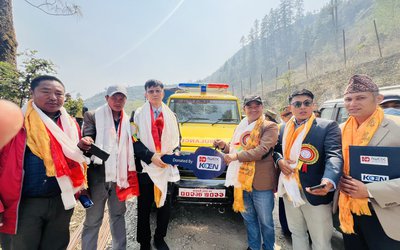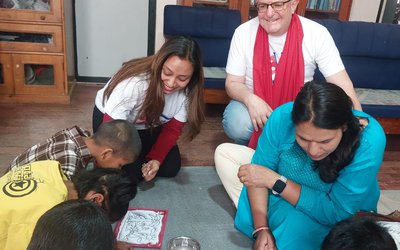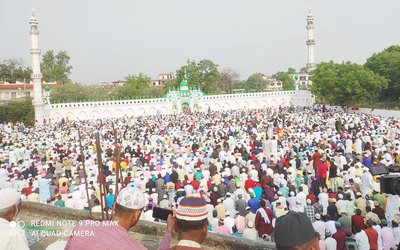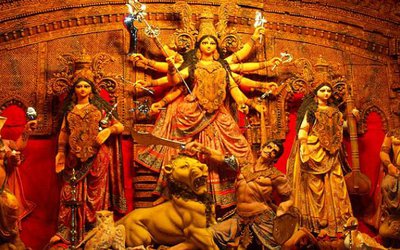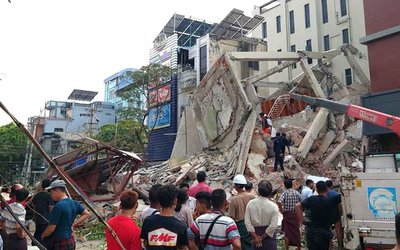
At a time when there are growing concerns over how to increase access of poor and marginalized communities in the programs and projects and social welfare schemes launched by local levels, the concept of Good Governance School (GG School) has shown a promise to make a difference.
Implemented by DCA and local NGOs in close coordination with the Local Governments (Palikas), through the financial support of Delegation of European Union in Nepal, GG School is a part of PARIWARTAN – Participation, Inclusion and Wider CSOs' Actions for Responsive, Transparent and Accountable local governance in Nepal Project. Following its implementation, the project has brought drastic changes in the livelihood of poor and marginalized people through increasing their reach to the resources and services available in remote Palikas of Sudur Paschim Province.
The experiences of Indra Paligi, Harina Devi Khadayat and Tara Devi, who are the participants of GG School, of KI Singh Rural Municipality of Doti District, show how increasing awareness level about the services offered by the local level benefits marginalized and poor people.
Participants of GG School, Indra Paligi of KI Singh Rural Municipality said that the last month, she went to the ward office and asked them about the procedures to get her children’s nutrition allowances. “I didn’t even know about the allowances until I joined this school,” she says.
“Now, I get Rs. 800 for my two kids, 400 each, every month. And I am able to buy them nutritious food and milk.” She further says this has been crucial support. “I am from a poor family, always struggling to feed my kids, and until now they relied on whatever I used to eat, no such nutritious food.”
Tara Devi’s confidence has enhanced following attending the class. “I was hesitant even to say my name until I joined this Good Governance School,” says Tara Devi of KI Singh Rural Municipality. “But now I can stand and tell about what I have learned - mainly the functions, duties and services of our local government, and what are the services that I am entitled to.”
“My son is now enrolled in the course for Junior Technical Assistant (JTA) at the Council for Technical Education and Vocational Training (CTEVT) - a technical school. I didn’t know anything about this course, but when I heard about the course from my facilitators (GG School Facilitator), my son applied for a seat and got it,” Harina Devi Khadayat said with a nonstop smile and laugh. “This has helped me very much.”

GG School provides different information about gender-based violence and legal aid services. Dropati BK of Jorayal Rural Municipality, a member of GG School, has been able to get justice once she knew polygamy was a form of GBV and had to take legal action for justice.
“GG School supported me to file the case and get justice. I won my property from my husband and also received a regular monthly salary as per my rights,” she shares her happiness.
Participants shared that they are now able to go to the ward offices seeking information about the budget planning and ask the ward committee to ensure their presence so that their demands are heard. They have formed a women’s group in every GG School.
Members of GG School are aware of harmful traditional practices and take action against such customs and practices. Mandhari BK, along with other 6 GG school members, organized a campaign against Chaupadi Custom in Jorayal RM 2, Melkhola, bringing a transformation in the community where 60 out of 85 Households have stopped practicing Chaupadhi and as women and girls remain at home during menstruation.
GG School is also linked with economic recovery activities. Under this project, the deprived communities have already been educated with the constitutional rights that have helped them to know the governance structure and through their initiations have started community projects and other income generation activities. So this will have both awareness component and income generation outcomes.
Not only aware of rights and entitlements, community people especially women are aware of the local planning process and budget allocation system. With this knowledge GGS member of Chaurpati have registered in CSOs - “Samajkalyan CSOs of Chaurpati Ward No.3 Dungri tole”; participated in the local government planning process and were able to receive NPR 400,000 from Local Government (Palika) and built multi-purpose community building to operate vaccination center and separate space for CSOs meeting and safe space for women and girls.
Constitution of Nepal and Local Government Operation Act-2017 allocate enormous authority to Palikas (Rural Municipalities and Municipalities). From birth to death, social security benefits to migration certificate, implementation of development projects and judiciary, many issues related to day-to-day life fall under the responsibility of the local governments, which provide necessary certification, authentication and recommendation.
According to the act, the local levels are responsible to issue 36 different kinds of recommendations, registration and authentication. Those include recommendations for citizenship certificates, poor and marginalized, land transfers, marriage and birth registration, free medicine, social welfare benefits, registration of industry, distribution of poverty cards, disability certification and so on.
Under the judicial power, Palikas also look at many disputes like transaction, family dispute and violence against women. Vice-chairperson of Palikas chairs the judicial committee.
However, rural people were facing a lot of difficulties to get their things done, unknowing the procedures, laws, regulations and other functions of Palikas and ward members and other office-bearers.
With a high prevalence of illiteracy and poverty, the people in remote areas of Sudur Paschim Province, especially are living in a miserable condition without interacting with local levels. Only a few people visit local offices for services.
Given such a scenario, GG School came as a savior for the local community and local levels to enhance interactions and connections. Satya Kumari Joshi, a facilitator of the GG School shared that it was difficult to convince women to come to the GG School, but after attending one session, they were excited to join the classes. “They even are asking that this should continue regularly.”
The project implemented in six Rural Municipalities of Sudur Paschim Province which include Jorayal, Shikhar, and K.I Singh Palikas in Doti; and Panchadewal Binayak, Mangalsen, and Chaurpati Palikas in Achham District has been greatly supporting the process to increase the level of understanding about the function, structures and programs of Palikas among the poor and marginalized communities of those areas.
“The project intends to address the barriers like poor awareness and knowledge of citizens on the functions of LGs, the changed local governance process, and citizen’s rights to participate in local governance process by raising awareness of citizens and their representative CSOs to constructively engage with LGs for improved transparency and accountability in local governance,” said DCA. “In the process, it is targeting to reach 7,200 citizens and 72 representatives.”
As the project is in the second year, the project helped empower citizens through knowledge and capacity building support. It has promoted participatory and inclusive decision making and planning processes, e-governance at the LG level for increased transparency and accountability. Besides that, the project has facilitated Local Government and Provincial Government interface for the multiplier effect and strengthened the multi-stakeholder engagement approach across the action.
After the implementation of the project, knowledge and capacity increased among citizens and CSOs to engage with and hold the Local Government (LG) accountable for improving governance. It also helped authorities to understand the needs and interests of citizens especially poor and marginalized citizens (women, Dalits and ethnic groups) as reflected in LG policies, plans and programs.
With increased awareness, inclusive and improved service delivery and monitoring mechanism have been established at Palika Level.
Nepal’s new constitution gives sweeping executive, judicial and legislative power to the local level making it inclusive and accessible to poor, marginalized citizens including women, Dalits and ethnic groups, people with disabilities and others.
The spokesperson at the Ministry of Federal Affairs and General Administration Basanta Adhikary agreed that local people have little knowledge about what services the local level provides to them and what they need to do to seek such services. Giving his own experience of working at the local level, he said the majority of people are still unaware of the fact that local levels are given the authority to connect the beneficiaries of social welfare schemes and allowances.
With limited resources, the Ministry has been working to raise awareness through mobilizing local FM stations. Provincial governments said they do not have any program to raise the awareness level in the community regarding service delivery provided to the local people.
“Since we have limited budgets to run such programs, we are implementing some programs in partnership with local and international NGOs in our province,” said Govinda Pokharel, information officer of the Ministry of Social Development.
GG Schools
To increase the access of local people, there is the need to generate awareness and understanding about governance. As all three tiers of government have been spending virtually, no budget on advocacy campaigns and awareness-raising activities is adequately available.
DCA’s Involvement
Since its start three decades ago, DCA has been advocating for the rights of most marginalized communities; and more specifically since 2008 through its dedicated theme -"Inclusive Citizenship for Accountable Governance" has been supporting to fight against discrimination and exclusion of women, Dalits and marginalized communities in the social and institutional structure and encourage inclusion and justice for all.
With the changes in the federal governance structures in the country and devolution of power to local governments after the promulgation of the constitution of Nepal in 2015, DCA in Nepal has been working very closely with the local government in developing inclusive plans, policies and programs to improve the access to resources and effective delivery of services to rights holders.
“If citizens understand and are aware of the governance system, it provides them the agency to hold the government accountable and ensure their rights are given with due diligence,” says Malati Maskey, Program Manager – Active Citizenship at DCA. “With the change in the government system, from central to the federal levels, it is important to empower local communities. This is only possible from the formal and informal education system.”
GG School is the informal education system for the adult literacy programs, Maskey added.
Local communities are provided informal and formal classes for half an hour, two days a week, where they are informed about the various aspects of the governance system. In the class, people are informed about the constitution, their rights and functions.
Teaching-governance
Ward Chairmen are also very much receptive and welcoming to the activities. “This is something that we need to do, but in the lack of budget and other priorities, we haven’t been able to reach to the communities,” says ward chairman Harka Bahadur Bista of Ward 7, KI Singh Rural Municipality, Doti district, praising the ‘initiative taken by the PARIWARTAN project’. He added that the project is helping them to achieve success.
Ram Bahadur Saud, Ward 3 Chairman of Chaurpati Rural Municipality in Achham district, says, “We could only see men coming for vital registration or any other work, but women are also coming to ward office seeking services. This is a huge change.”
He added that earlier women were only kept in the committees or invited in programs just for the sake of their presence; however, they are now claiming their rights and raising their voices.
“This actually is making a difference and we as people’s representatives are finding it easier to deal with their demands,” says Saud. “Through this school, they have also learned about the process of ward development planning and the relevant persons to talk to."
Although GG School is invisible at the broader national level, the project increases citizens’ meaningful participation in Sub-national-good governance in Nepal. It also empowers citizens and their organizations to effectively engage with local levels in promoting transparency and accountability in the governance processes in Province 7 of Nepal. The project has been generating the awareness of local people to get services offered by local levels as well as improving the governance level.
(With reporting and photos from Ishwar Rauniyar)

- IME GROUP: Expands Into Paper Industry
- Mar 24, 2025
- CPN UML: Instigated By India
- Mar 23, 2025
- ADB’S CHIEF ECONOMIST: Nepal Reduces Poverty
- Mar 11, 2025
- FM DR. DEUBA: A Successful Visit
- Mar 11, 2025
- MD GHISING: Target Of Personal Grudge
- Mar 09, 2025





